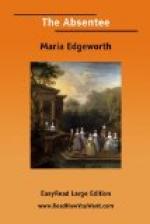eagerness of attention, and pleased by our hero’s
manners and conversation; so that, to their mutual
satisfaction, they spent much of their time together
whilst they were at this hotel; and, meeting frequently
in society in Dublin, their acquaintance every day
increased and grew into intimacy—an intimacy
which was highly advantageous to Lord Colambre’s
views of obtaining a just idea of the state of manners
in Ireland. Sir James Brooke had at different
periods been quartered in various parts of the country—had
resided long enough in each to become familiar with
the people, and had varied his residence sufficiently
to form comparisons between different counties, their
habits, and characteristics. Hence he had it in
his power to direct the attention of our young observer
at once to the points most worthy of his examination,
and to save him from the common error of travellers—the
deducing general conclusions from a few particular
cases, or arguing from exceptions as if they were rules.
Lord Colambre, from his family connexions, had of course
immediate introduction into the best society in Dublin,
or rather into all the good society of Dublin.
In Dublin there is positively good company, and positively
bad; but not, as in London, many degrees of comparison:
not innumerable luminaries of the polite world, moving
in different orbits of fashion, but all the bright
planets of note and name move and revolve in the same
narrow limits. Lord Colambre did not find that
either his father’s or his mother’s representations
of society in Dublin resembled the reality, which
he now beheld. Lady Clonbrony had, in terms of
detestation, described Dublin such as it appeared to
her soon after the Union; Lord Clonbrony had painted
it with convivial enthusiasm, such as he saw it long
and long before the Union, when first he drank
claret at the fashionable clubs. This picture,
unchanged in his memory, and unchangeable by his imagination,
had remained, and ever would remain, the same.
The hospitality of which the father boasted, the son
found in all its warmth, but meliorated and refined;
less convivial, more social; the fashion of hospitality
had improved. To make the stranger eat or drink
to excess, to set before him old wine and old plate,
was no longer the sum of good breeding. The guest
now escaped the pomp of grand entertainments; was
allowed to enjoy ease and conversation, and to taste
some of that feast of reason and that flow of soul
so often talked of, and so seldom enjoyed. Lord
Colambre found a spirit of improvement, a desire for
knowledge, and a taste for science and literature,
in most companies, particularly among gentlemen belonging
to the Irish bar; nor did he in Dublin society see
any of that confusion of ranks or predominance of
vulgarity of which his mother had complained.
Lady Clonbrony had assured him that, the last time
she had been at the drawing-room at the Castle, a
lady, whom she afterwards found to be a grocer’s
wife, had turned angrily when her ladyship had accidentally
trodden on her train, and had exclaimed with a strong
brogue, ’I’ll thank you, ma’am,
for the rest of my tail.’




